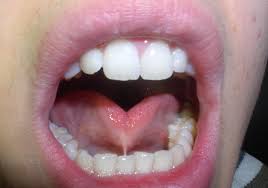Tongue-tie, also known as Ankyloglossia or anchored tongue, refers to a condition where the lingual frenum, or the skin that connects your tongue to the base of your mouth, is too tight. The problem occurs when the frenum is connected to the tongue’s end. A tight frenum restricts a patient’s ability to use their tongue properly.
Tongue and lip ties can impact speech development and make it difficult to eat and swallow, especially in babies and toddlers. Tongue-tied problems include:
- Pain in jaw
- Harder to brush and floss
- Difficulties eating and speaking properly
- Older patients may have difficulties keeping dentures in place
- Higher risk of inflamed or irritated gums
Causes of Tongue Tie
Multiple things can cause a tongue tie. Typically, the cause is an unusually thick or short frenulum. This may be something that a single person develops, or it can have genetic causes. A congenital defect can cause it, as can mouth trauma, certain viruses, and acid reflux conditions.
When we consult with you about your tongue tie, we’ll discuss your medical history and do a thorough oral exam. This helps us determine the root cause of your situation. If we can treat that root cause, we can help your condition and ensure that it’s taken care of properly.
Tongue Tie and Sleep Apnea
Tongue ties and sleep apnea have a dangerous connection. Tongue tie can be one of the causes of sleep apnea. The restricted tongue can only move in certain ways and has no full range of motion. Because the tongue can’t move properly, it can block your airway when sleeping through the night. It stops your breathing every time that this happens.
Untreated sleep apnea can have serious consequences for your health. Even though you think you’re getting a full night of sleep, you’re actually waking up multiple times throughout the night. You become fatigued, have mood swings, and are at higher risk of anxiety and depression. People with untreated sleep apnea are also more likely to suffer from high blood pressure, strokes, heart disease, and more.
Sometimes, treating tongue tie can improve your sleep apnea symptoms. You may not need further treatment after you get a frenectomy. If we perform this procedure, we’ll monitor your condition closely after to determine if we need to progress with treatment for sleep apnea.
Reasons To Correct A Tongue Tie

Tongue-tie can sometimes resolve when the frenum loosens as a child ages. However, surgical intervention is often necessary. There are several reasons a patient may want to correct a tongue tie.
Tongue ties can limit the tongue’s mobility, interfering with normal activity. Patients are born with this condition, which can impact their early speech development.
- Improve speech development
- Prevent gum recession
- Prevent gap teeth
- Better fit for dental restorations
- Better movement in the tongue
- A better orthodontic correction success rate
Treatment for Tongue Tie in Knoxville, TN
Knoxville, TN periodontist Dr. Robert Cain offers a frenectomy comprehensive treatment for tongue-tie. A frenectomy is a surgical procedure that removes or releases the frenum. A standard and relatively quick procedure, Dr. Cain can detach the frenum releasing the tongue’s mobility.
The treatment to release or remove a frenum was once a surgical procedure involving sutures, more bleeding, and longer healing times. Dr. Cain uses innovative laser technology to reduce discomfort and swelling and allow the patient to heal faster. A laser frenectomy is a brief treatment that the dentist completes from the comfort of our dentist office.
It can usually be completed in just as little as 30 minutes. The procedure is completed under local anesthetic, ensuring the patient is comfortable during treatment. High-quality lasers are used to precisely and accurately remove unnecessary frenum, causing little to no bleeding or pain after the procedure.
Post-op care is extremely important after a frenectomy. Even though there is little chance of complications, keeping your mouth clean after the procedure is very important. Most patients only experience minor pain and swelling as the operation site heals over the next few weeks. Following your post-op instructions will help promote proper healing and achieve desired results.
The dentist uses a state-of-the-art dental laser. Laser dentistry minimizes bleeding and swelling, eliminates the need for painful sutures, and allows faster healing times. Laser frenectomy allows patients to return to their daily lives almost immediately with minimal discomfort or side effects.
Request an appointment with Dr. Cain and schedule an evaluation for your child. A laser frenectomy is a safe, effective, and permanent treatment for tongue-tied babies and children.
Tongue Tie FAQs
Tongue tie can impact various aspects of your oral wellness and development. Learn more about the condition by reading the answers to these frequently asked questions.
What speech sounds are affected by tongue tie?
Patients with tongue tie may struggle to pronounce certain letters, sounds, and words. The most common ones that tongue-tie interferes with are t, d, z, s, th, r, and i. All of these letters require the use of the tongue to pronounce them correctly.
How long does tongue-tie surgery take?
Tongue-tie surgery is a very short operation. Using lasers allows dentists to perform tongue-tie procedures in less than 5 minutes.
Will my insurance cover a tongue-tie procedure?
Typically, insurance doesn’t cover this procedure. However, it all depends on the specific insurance that you have. If you think your plan may cover a frenectomy, we’ll assist you in filing the correct paperwork for a claim to send to your insurance company.
Does a tongue tie release hurt?
You may notice some discomfort and soreness for a few days after the procedure. The muscles around your lip and chin can be a little sore. The actual site of the procedure will feel slightly like a burn in your mouth, and you may also experience some swelling these first few days.
Can I eat after tongue tie surgery?
For a few days after the surgery, stick to soft foods and avoid any that are too hot or cold, as this can irritate the area. Salty and acidic foods can irritate the condition as well. As you heal, you can slowly move yourself to solid foods again.
How should I sleep after getting this procedure?
Sleep with your head elevated at around 30-40 degrees for the first few days after the procedure. This helps it heal properly, decreasing swelling and improving your breathing so that you can get a good night’s rest.
